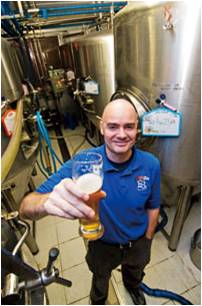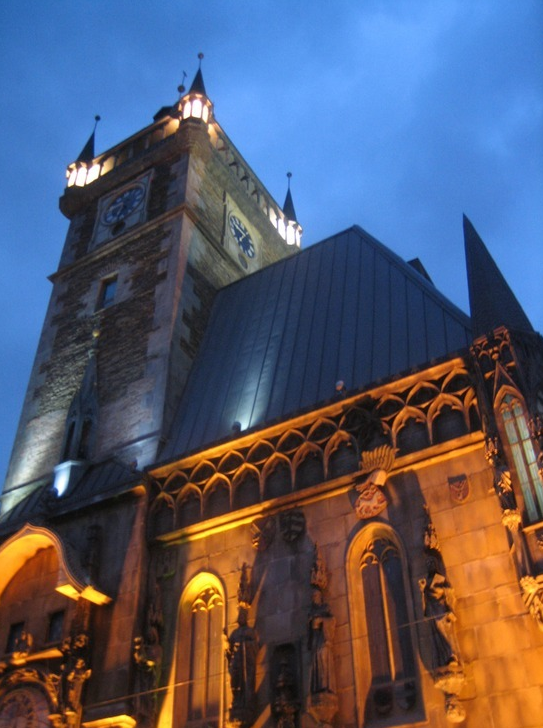The Beer Necessities; Craft Beer in Korea
Posted by 10 Media on November 30, 2009 · 2 Comments
Words by Andray Abrahamian,
with additional research by Kwon Yeong-min

Modern Time Brewmeister/Owner Boris Demesones
Korea is something of a beer desert, but oases are starting to appear.
Beer has undergone a renaissance in the last 20 years or so. However, ever since ancient Egyptians discovered how to control fermentation to make booze, wine has been for the wealthy, beer for the masses. Quality in beer has never been sought after, as it has with wine. What was important was that it was cheap, got you drunk and, more recently, gave you the impression that you’d have bikini-clad women flock to your side while your bros backslap and guffah in congratulations on how manly and awesome life is. Indeed, for most of the latter 20th century, aggressive marketing by huge beverage corporations combined with our inability to remember that what we eat and drink shouldn’t be industrially produced has meant that for most of the planet, having a beer means a glass of fizzy, off-yellow, tasteless, mixed-grain pee. Perhaps nowhere is that more true than in South Korea, where the mass produced lagers are about as bland as beer can be.
Korea’s awkward relationship with beer can be traced back, like so much of its difficult transition to modernity, to the Japanese. Japanese colonizers brought their newfound taste for beer with them, but only local elites (read: collaborators) had the chance to share this new and interesting beverage. The Japanese big three set up breweries here, and then after liberation their breweries were doled out to newly-founded Korean companies OB, Cass and Jinro-Coors. The war came and quality suffered in the years of hardships that followed. Consumption, however, continued to increase as locals found a taste for the carbonated beverage. By the time Lee Hyori released her comeback album in 2008, more beer was sold than all other Korean alcoholic beverages combined.
Beer has become big business here and is dominated by two well-connected and influential companies, Hite and OB (which owns the Cass brand, swallowing up Jinro-Coors during the 1997 financial crisis). The bad news is that these companies have been overly protected by the government, allowing them to vomit out inferior product for over half a century. The good news we’ll get to in a minute.
The first dam holding back good beer is a whopping 30% import tariff. (To put that in perspective, the US has a 1% tariff on imported beer, the EU, China and Australia have none.) This has prevented all but the biggest foreign brands from having a crack at the local market and turns relatively decent, though not amazing, quality beers such as Hoegaarden and Guinness into something of a luxury item. Fortunately, the recently inked EU-Korea Free Trade Agreement includes beer and beer ingredients such as malts and becomes effective as soon as it is ratified. This trade deal doesn’t face some of the hurdles that the US-Korea FTA faces, so it is expected to pass in early 2010. Automatically, beer from Belgium, Germany and the UK will be cheaper and easier to import, thus developing local interest and taste buds.
The second dam holding back the flow of quality beer onto our tables and into our bellies has been restrictions on microbrewing. To get a brewing license you have to brew an impossible 3,000 kiloliters of beer annually. No homebrewing, no brewpubs…nothing small scale. Japan had roughly the same heavily restricted situation until 1994, when the government removed almost all the restrictions on quantity. It is now home to one of the most lively craft brewing scenes in the world. (Try to get your hands on Hitachino Nest next time you’re there for a visa run or weekend break.)
In 2002, under pressure from the tourist industry and in anticipation of the World Cup, some restrictions were lifted. Small breweries with restaurants were allowed to operate and German brewmasters were brought in en masse to train locals in the art of brewing. Korean craft brewing was born in the curiously named O’Kim’s at COEX in Gangnam. Hundreds of mostly German-style beer halls quickly popped up all over the peninsula, though stand-alone breweries were still not allowed and off-site sales and bottling remained prohibited. Compounding this cautious approach by the government were high tariffs on malts and hops, which still keep the prices high on the end product.
Still reluctant to relax on its chokehold on brewing, the government finally legalized bottling beer last year, but only for on-site sales. This law came into effect a few weeks before the global financial meltdown, and no one was in the mood to experiment with expensive new bottling equipment or untested markets. Ill-timing, but still, if you want, now you can take a PET bottle into a microbrewery and get it filled to take home to drink while watching your favorite KBL (Korean Basketball League) team on TV. The Korean Microbrewing Association is working with the government towards bottling and distribution in 2010, which is the game changer brewers and beer fans have been waiting for these six long years. This will certainly bring an explosion in choice, increased competition, and ultimately, better beer.
Okay, fine, but you can’t drink hope for the future. It’s rarely hoppy enough, for one thing. How to satisfy today’s thirst? Seek out one of these brewpubs that are fighting through the web of restrictions and regulations to brew. With tough economic times causing a rash of brewpub closures in the last twelve months (perhaps over 50 nationwide, according to a member of the Korean Microbrewer’s Association), you can get merry and warm this winter while supporting local beer at the same time.

Castle Praha
Castle Praha Hongdae Branch
Seoul: Gangnam Station, Itaewon, Hongdae
This brewery is a Czech-themed place with a handful of locations around Seoul. A slight deviation from the Germanic brewpubs you usually find, the food menu is a bit more Bohemian and the beers more Czech-inspired, including a tasty Euro-dark lager style called Granat. It is also the only place to find Primator, an excellent Czech pilsner, in bottles.
Homepage URL , castlepraha.co.kr
Gangnam 02-596-9200,Hongdae 02-334-2121, Itaewon 02-3785-2181 |